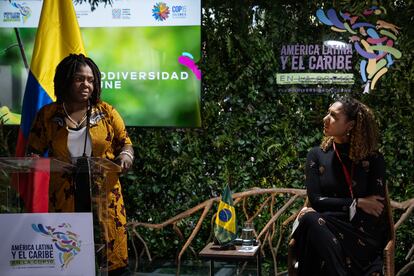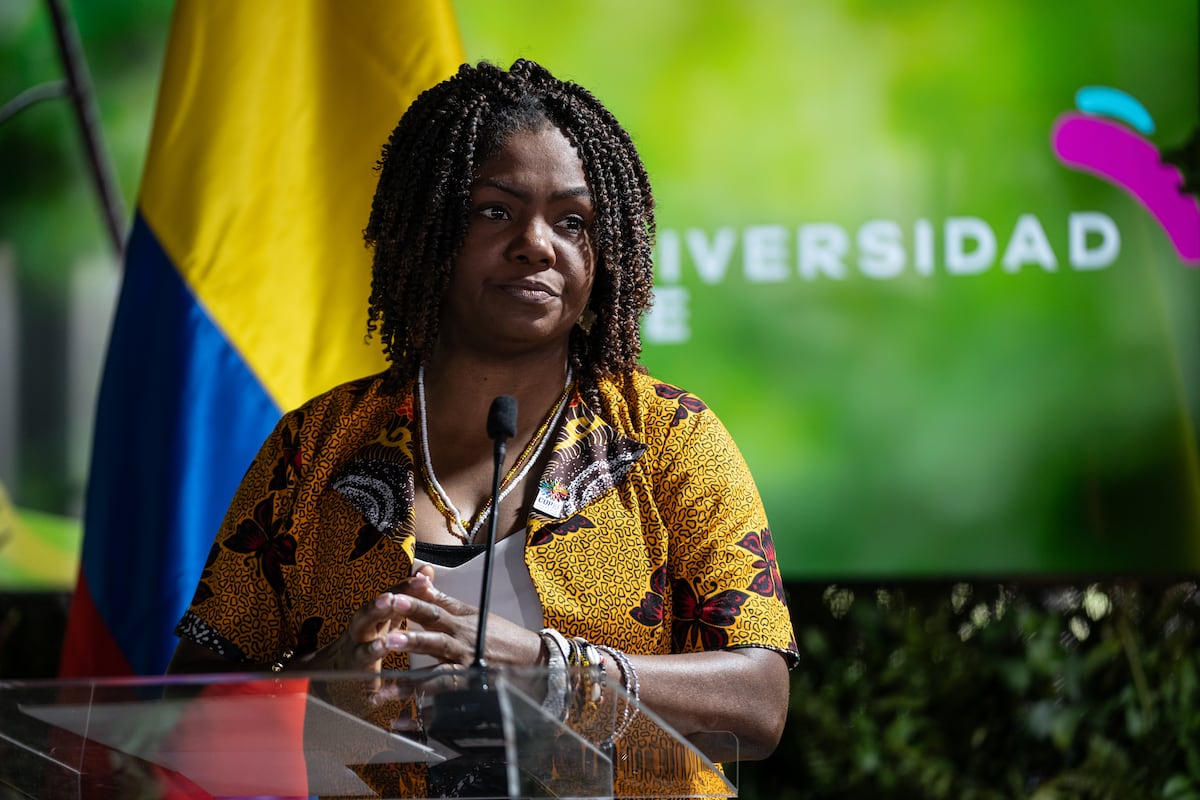EL PAÍS offers the América Futura section openly for its daily and global information contribution on sustainable development. If you want to support our journalism, subscribe here.
The world biodiversity summit being held these days in Colombia is returning to France Marquez to the essence of their struggles. In the COP16 from Cali, gateway to the Pacific, a region where she emerged as an environmental leader, the vice president and Minister of Equality has proposed that the United Nations system—which organizes these summits—pay off a “historic debt” and recognize the peoples Afro-descendants of America.
“We, as people, have always had to fight for recognition (…) It has been a historic fight. And that has roots in that slave and colonial system that expropriated our human condition,” Márquez said Thursday at the end of the international forum on people of African descent at COP16, while the Colombian Foreign Minister, Luis Gilberto Murilloand the former vice president of Costa Rica Epsy Campbell They nodded their heads. “The recognition of our being, of our culture, of our memory, of our territory, of what we are as people is part of the restoration of our dignity. Our ancestors did not renounce it and we do not renounce them.”
The demand, promoted by Colombia and Brazil at COP16, is that people of African descent be included within the framework of the Convention on Biological Diversity (CBD). This point has sparked heated debates in the first week of the summit. As explained in that same press conference by the president of the UN Permanent Forum on People of African Descent, June Soomer, the United Nations system already recognizes the term Afro-descendant, but the fight now is for them to be recognized as a collective, something that has been found rejection from some countries, including some in Africa.
“Many countries, and not just African ones, do not recognize us as a collective (…) Because if they recognize us as a people, they also recognize the collective damage that has been done to us,” said the official from the Caribbean island of Saint Lucia. “If we achieve it in this COP, you cannot imagine the historical importance it will have, because it will give us back the dignity that we deserve as a people.”
As it is now written, the article 8j The agreement recognizes the knowledge, innovations and traditional practices fundamental to the conservation of nature, promotes their application and that the benefits derived from them are shared equitably among those who possess them. But the text only talks about “indigenous and local communities,” and Brazil and Colombia want people of African descent to also be included. And for that, it is necessary that the 196 countries that make up this COP agree.
Anielle Franco: “There can be no climate justice without equality”
The vice president of Colombia has made this recognition her personal crusade during this COP in Cali, the second city with the largest Afro population in Latin America, after Salvador de Bahía. On Monday, on the opening day of the summit, he participated in an event with the Minister of Racial Equality of Brazil, anielle francoin which he called it “discriminatory and racist” that the knowledge and practices of the Afro-descendant population are not taken into account to conserve biodiversity.

“It is not possible to talk about the conservation of the planet’s biodiversity leaving out a significant number of population and territory,” he said during the inauguration of the CAF pavilion-bank of Latin America at the summit. And he recalled that, in the region, there are more than 150 million Afro-descendants who inhabit territories equivalent to more than 205 million hectares.
For her part, Anielle Franco defended that there can be no climate justice without racial equality. For this reason, one of the first conversations he had with the Brazilian Minister of the Environment, Marina Silva, was about quilombola communities, as he explained. “In Brazil, environmental racism affects black people, people of African descent, and poor people much more,” Franco said in conversation with América Futura. “The majority of people who lose their homes when it rains a lot and there are landslides in the favelas are black people.”
Like the vice president of Colombia, who was born in the department of Cauca, from which she was displaced a decade ago due to threats, the Brazilian Minister of Equality—raised in the Maré favela of Rio de Janeiro and sister of the murdered councilor Mariela Franco— also knows firsthand how exclusion and violence disproportionately affect people of African descent.
Paradoxically, Franco recalled, indigenous peoples and quilombolas “are agents of conservation of the land, nature and climate.” During the CAF event, the minister announced the Afro-descendant Peoples of the Americas program, a bilateral initiative between Brazil and Colombia for the conservation of biodiversity and the implementation of sustainable agricultural systems to “face the racial and socio-environmental inequalities that affect these historically excluded and marginalized peoples and communities,” he said during the presentation.
This is just one step in the fight for equality promoted by both policies, which hope to leave the summit with an additional victory: that the agreement recognizes Afro-descendant peoples in the fight against the loss of species, something that, as Márquez recognized , it would be historic for environmental justice. “We have not been on paper, but we have been in concrete action defending rivers, mangroves, forests and seas, defending life, defending ecosystems because we, Afro-descendants, without territory are not a people.”




